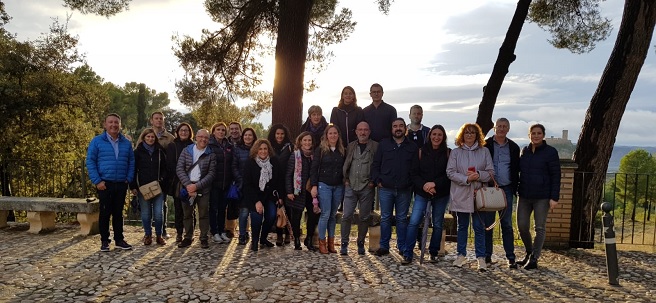
25 de October de 2019
Dinamización rural
October 25, 2019. The work of Local Action Groups (LAGs), local governments, and other stakeholders in rural areas to coordinate public policies requires a thorough understanding and application of the various regulations and tools related to public procurement. To address this need, the National Rural Network (RRN) organized a training workshop in which experts analyzed the Public Sector Contracts Law and its specific application to Local Action Groups.
The training course, held in Biar (Alicante) from October 21st to 24th, organized by the RRN, provided an opportunity to delve deeper into Law 9/2017, of November 8th, on Public Sector Contracts and its application to Local Action Groups. The LAGs, present and from different Autonomous Communities, shared experiences with a view to considering different ways of proceeding to streamline their procedures.
The first day's session began with a training presentation by Carlos Cardosa, administrative and financial manager of the "Entreparques" GAL, who explained the objective and subjective scope of the Law , and also addressed the problems arising from its application. After this session, it was concluded that GALs are considered non-public administration contracting authorities , known as PANAH , governed by the provisions of said law (Title I of Book III). The main change compared to the previous law is the elimination of contracting instructions .
On the second day of the course, Irene Bonet, a State Attorney at the Ministry of Public Works, outlined all the procedures to be followed when entering into a contract, as well as the different types of contracts included in the standard, based on size and other characteristics . She also delved into the capacity and solvency requirements of the GALs and how to define the award criteria in tenders .
From the perspective of regulatory control and verification of co-financed expenditures , expert Lluis Noguera analyzed the critical aspects of contracting the following day. Noguera recommended good practices for contracting procedures, such as planning contracts to meet the deadlines required in advertising or using appropriate and correct award criteria . He also reviewed the criteria for applying financial corrections by the EAFRD authorities.
On the last day of the workshop, the presentation by the financial administrative manager of the GAL CEDER “Valle del Tiétar” , José de Álvaro Benito, went into detail about the minor contract , and what “article 118” establishes regarding the contracting file .
All sessions were accompanied by theoretical and practical content, with a significant focus on addressing and sharing real-life situations. This has resulted in the need to provide guidance and direction for the Local Action Groups . The law is a living law and subject to multiple interpretations , so it is essential to continually work on understanding it.
The presentations gave rise to an interesting exchange among the attendees , which, among other issues, highlighted the need for further training in the subject through practical workshops, where, for example, practical cases were presented on how to prepare technical specifications , how to publish a tender on the Public Sector Procurement Platform , or how to delve deeper into the social and environmental clauses of contracting.
Another issue worth highlighting is the need for this law, as well as all state policies and laws, to adapt to the reality of rural areas.
The training sessions were complemented by cultural activities , such as visits to a nougat workshop , a ceramics factory , and the rural setting, dominated by its majestic castle in one of the wooded areas of the province of Alicante.
The presentations and upcoming activities on the subject will be published on our website soon.









